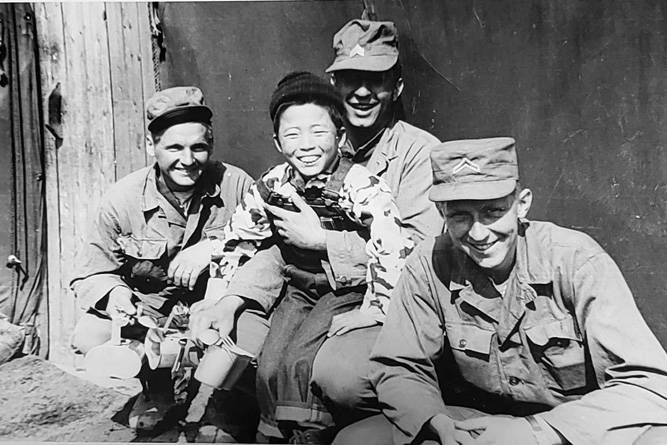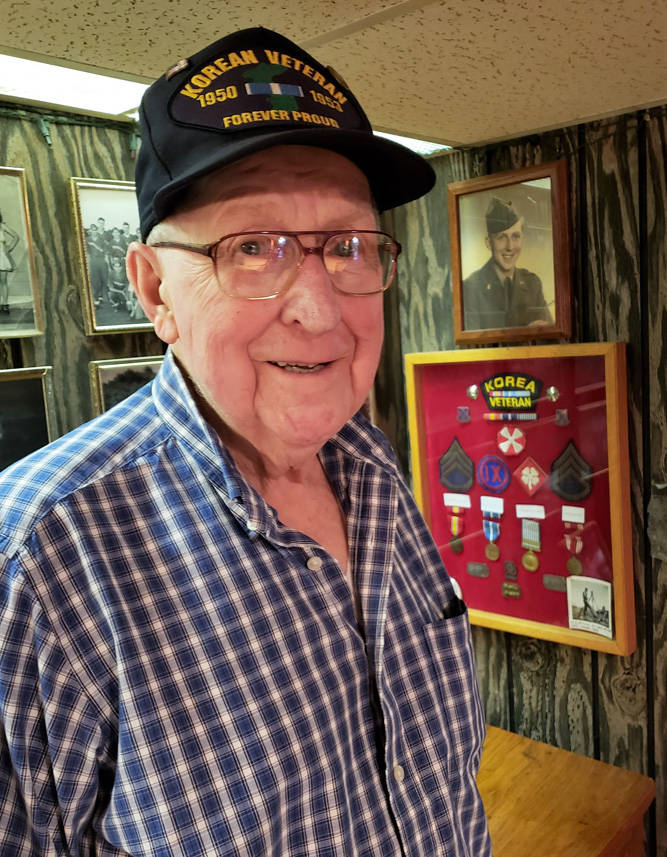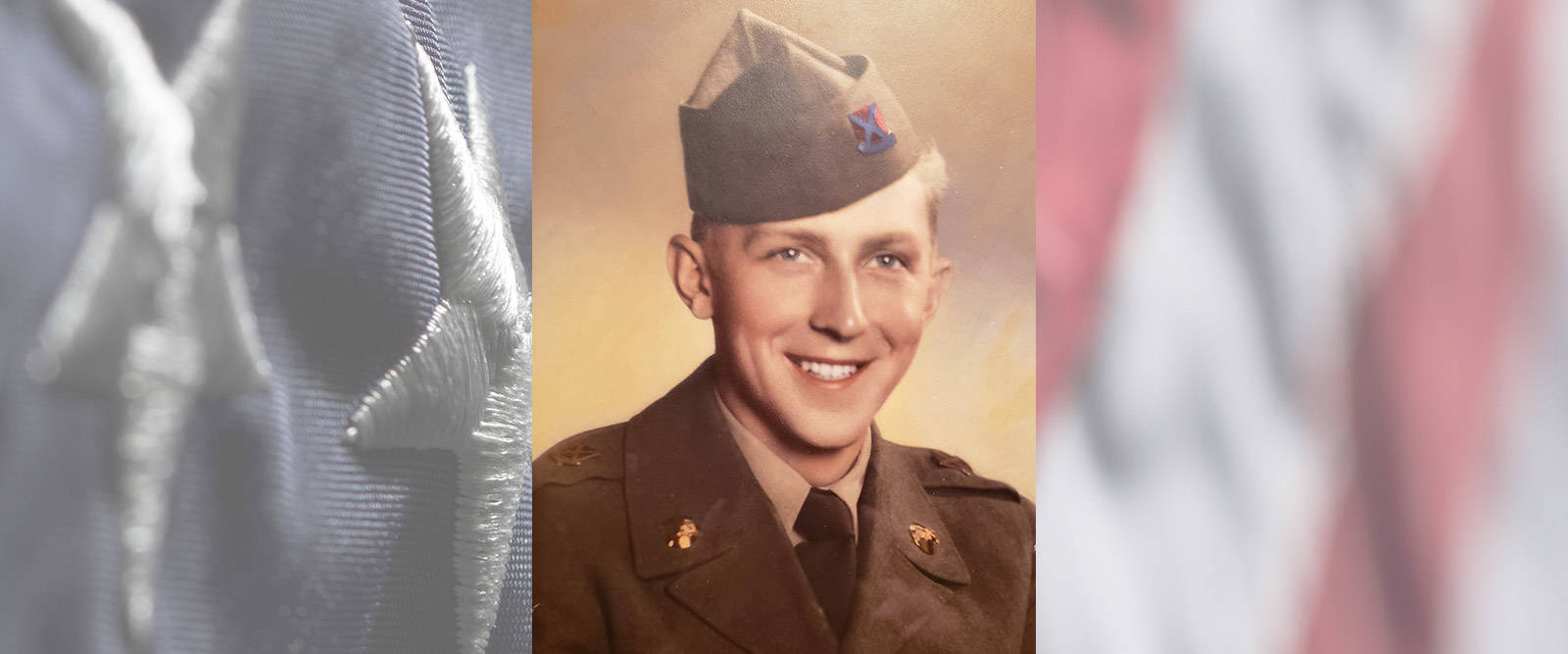U.S. Army Korean War Lyons, IL Flight date: 05/09/18
By Dave Koziol, Honor Flight Chicago Veteran Interview Volunteer
Robert “Bob” Dahms was born in Oak Park, IL in June, 1931 and was raised in the Chicago suburb of Cicero. Bob was the third of four brothers and his two older brothers served during World War II. Richard, the oldest, served in the Army Air Corp while Donald served in the Coast Guard. Bob was next up; he would be drafted during the Korean War in May, 1952. Leonard, the youngest of the brothers, would escape the long arms of the U.S. military’s grasp.
Bob did not pass the physical when initially reporting for the draft and had to spend five days at Hines Hospital for additional testing. When released, he was classified 1A, the highest classification available for unrestricted military service. Bob had been married to his childhood sweetheart Jean for eleven months when Uncle Sam ordered him to report to Ft. Sheridan, IL on May 16, 1952. A large group left from Ft. Sheridan with half going to Ft. Chaffee, AR for armored infantry training while the other half, which included Bob, sent to Ft. Sill, OK, for artillery training.
Bob completed eight weeks of Basic Training and then eight weeks of specialized training at Ft. Sill. Jean was able to live off-base near Ft. Sill with the wife of another married soldier. The two soldiers were able to see their wives on the weekend. After the sixteen weeks of training and a short two-week furlough, Bob was assigned to the 235th Forward Observation Battalion. This was a highly specialized unit and Bob soon realized he would be leaving Jean behind in the states. The battalion consisted of four Batteries: A, B, C, and Headquarters. Bob was assigned to the survey section of A Battery and his job title was “instrument man.” He reflected on being told he was going to Korea saying, “I had no choice,” but felt proud to do his duty.
The battalion left Ft. Sill on November 25, 1952 and arrived in Incheon, Korea on December 13, 1952. They traveled to San Francisco, CA and then aboard the troopship, the USS Brewster. This ship was an older single stack transport and it took eighteen days to reach the Port of Incheon. Bob says, “It was the worst time I spent in the service, and the sickest.” It took him three days to get his “sea legs” during that voyage. The Port of Incheon was too shallow for the USS Brewster to enter. The men had to be loaded into LST’s and transported to the mainland.
After a short stay in Incheon, the battalion left for Yong Dong Po, Korea to wait for the completion of their forward base camp. This camp, Bob’s home for the next year, was completed soon after Christmas ,1952. It was located just south of the Chorwon Valley, a highly contested area during the war. Bob’s survey section of A Battery was assigned to the west section of this valley. The survey section consisted of thirty men, living and sleeping in three 10-man squad tents. Also, in base camp were the other sections of A Battery, called flash, sound and radar. These sections, unlike Bob’s, also had forward observation posts.


One of the survey section’s duties was to establish fixed survey markers in the Chorwon Valley. Some of these markers were previously established by the Japanese during World War II, making their job a little easier. They would also survey the fixed positions of the “enemy spotting equipment” of the flash, sound and radar sections of A Battery. Then, by triangulation, each section of A Battery would know the exact coordinates of enemy activity when observed. The work of the survey section would allow the forward observation posts to call in very accurate artillery fire.
The survey section worked up and down the ridges and valleys of the Chorwon Valley every day, many times arriving “home” to base camp after dark. Bob stated, “The cooks would have to save supper for us.” Also, “The winters were very, very cold. Thank God for insulated boots.” Bob and his tent mates took in a young Korean boy who they named “Peanuts.” He would do odd jobs for them and keep their tent clean. Bob’s wife Jean sent “Peanuts” a blue jean overall outfit which he proudly wore.
Bob came under enemy fire a few times before the cease-fire in July 1953, once while driving in a jeep through a crossroads the enemy had targeted. Another time, they were playing in a softball game against one of the firing battery’s softball teams. That game ended with both teams jumping into nearby ditches for cover. A cease-fire was negotiated in Korea and was to begin on July 27, 1953 at 10:00am. However, just before that time, the U.S. guns began a terrific barrage of artillery which fell deadly silent at 10:00am. Bob witnessed this and stated, “It was so quiet, you couldn’t believe.” The hostilities ended, but Bob and the survey section continued to do their work.
The cease-fire cleared the way for a rotation of men back home, and Bob found himself, now a Corporal, in charge of the survey section. By September, he was fast-tracked and promoted to Sergeant, a rank appropriate to head the survey section. He left Korea on Dec 22, 1953, as the Sergeant in charge of the section. This time he was aboard the two-stack transport USS Wheeler from Incheon to San Francisco. This voyage only lasted fourteen days, with the USS Wheeler arriving in San Francisco on January 4, 1954.
Bob, now a Sergeant, got to enjoy the trip home. He somehow avoided KP and guard detail, which he had to do as a Private on his voyage to Korea. After arriving in San Francisco, he travelled by train back to Ft. Sheridan and was eventually discharged on February 14, 1954. His Service Awards include the National Defense Service Medal, the Korean Service Medal with two Campaign Service Stars, the United Nations Korean Service Medal, and the Republic of Korea War Service Medal.
Bob and Jean moved from Cicero to Lyons, IL in 1957 and raised their family. They have two children, Kathleen and David, and three grandchildren. After his service Bob, among other things, worked at Sunbeam Corporation and owned the Dandee Drive-In (located one block east of Cicero on Archer) with his brother. His last job was with the Woodwork Corporation of America, retiring as a union carpenter. A cherished moment for Bob happened on June 1, 2013. He was invited to be an honored guest of the Chicago Blackhawks during a playoff game. He was introduced as a Veteran of the Korean War and got to stand on the United Center ice during the singing of the National Anthem.
Bob, thank you for your exceptional military service. Enjoy your much-deserved Honor Flight.



